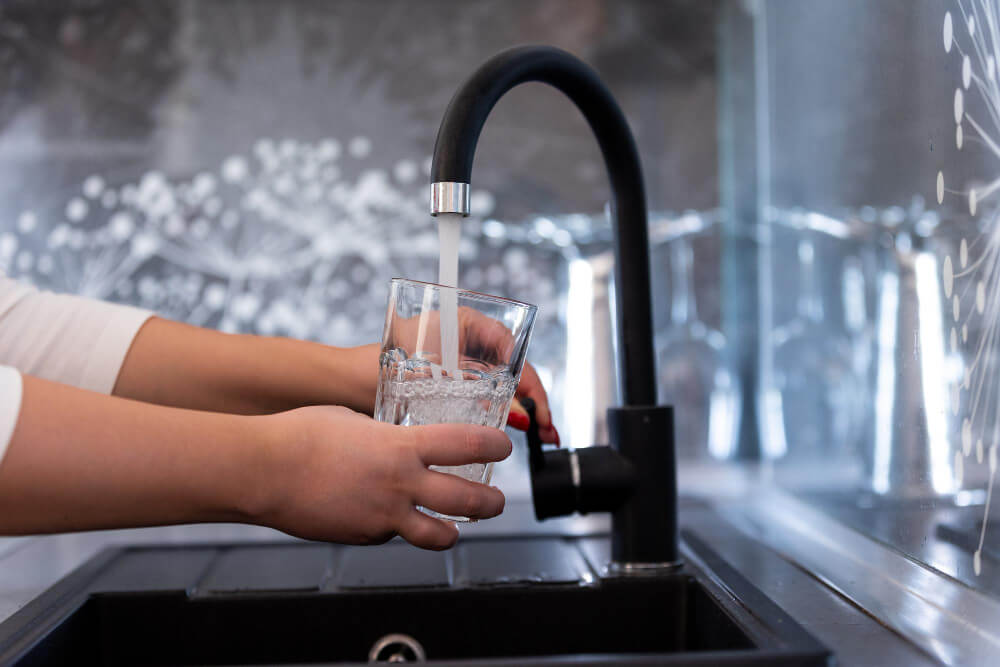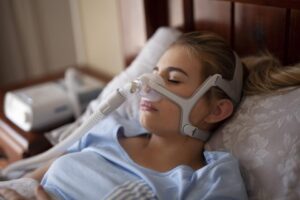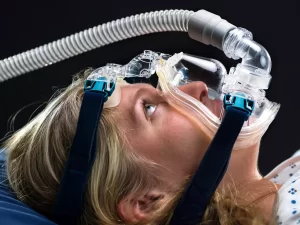While using tap water in your CPAP machine for a single night might seem like a trivial matter, it’s a decision with potential long-term consequences. From mineral buildup to allergens and damage to your CPAP machine, using tap water with your CPAP is a risk not work taking.
Table of Contents
Here’s why relying on tap water can be detrimental to both your CPAP machine and your sleep quality:
Tap Water in Your CPAP will Cause Mineral Buildup
Tap water contains a cocktail of minerals that can wreak havoc within your CPAP’s delicate humidifier chamber and tubing. These minerals leave behind deposits that:
- Restrict airflow: Clogged components impede the machine’s ability to deliver optimal air pressure, compromising its therapeutic effectiveness.
- Damage the machine: Mineral buildup can corrode internal components, potentially leading to malfunctions or reduced lifespan.
- Harbor bacteria: The moist environment within the machine creates a breeding ground for bacteria in mineral deposits, posing a potential health risk.
Some of the Chemicals in Tap Water Can Be Harmful
While tap water is treated for safety, it may still contain trace amounts of chemicals, chlorine, or even microscopic organisms. Inhaling these substances overnight can irritate your lungs and airways.
Tap Water Can Contain a Host of Pathogens
Tap water can harbor a variety of microorganisms with the potential to cause illness. While the extent of this risk depends on factors like location and treatment processes, here are some common pathogens found in tap water:
Bacteria
- Coliform bacteria: These include E. coli, which can cause severe diarrhea and vomiting. Their presence typically indicates fecal contamination in the water source.
- Campylobacter: This bacteria can cause fever, abdominal cramps, and bloody diarrhea.
- Salmonella: This can cause typhoid fever or food poisoning, leading to severe illness.
- Legionella: This bacteria can cause Legionnaires’ disease, a type of pneumonia.
Protozoa
- Cryptosporidium: This parasite can cause severe watery diarrhea and vomiting.
- Giardia lamblia: This parasite can cause giardiasis, leading to diarrhea, stomach cramps, and weight loss.
Viruses
- Norovirus: This highly contagious virus causes norovirus gastroenteritis, leading to vomiting and diarrhea.
- Hepatitis A virus: This virus can cause liver inflammation and jaundice.
Keeping tap water away from your CPAP machine and accessories is a great way to prevent illness and contamination.
Warranty Loss If You Use Tap Water with Your CPAP Machine
Using tap water in your CPAP machine can void the manufacturer’s warranty, leaving you financially responsible for repairs or replacements caused by mineral damage.
Therefore, prioritizing distilled water, as recommended by your doctor and CPAP manufacturer, remains the safest and most reliable option. Distilled water is free of minerals and contaminants, ensuring:
- Optimal airflow: Unimpeded air delivery for effective sleep apnea therapy.
- Machine longevity: Protection against mineral buildup and corrosion.
- Reduced health risks: Elimination of potential bacterial growth and inhalation of harmful chemicals.
Alternative Solutions to Tap Water in CPAP
If distilled water is unavailable, consider these temporary options:
- Boiled tap water: Boiling water for at least 1 minute kills most bacteria, but it doesn’t remove minerals. This might be a last resort, but distilled water is still preferable.
- Bottled water: Choose brands labeled “distilled” or “demineralized” for optimal purity. Ensure the bottles are unopened and sterile.
Remember, prioritizing proper CPAP maintenance and using the recommended water type will not only ensure your machine’s longevity but also contribute to a healthier, more restful sleep experience.
Read more: What Happens if Your CPAP Runs out of Water
FAQ on Can I Use Tap Water in My CPAP
What Happens if I Use Tap Water in My CPAP?
Using tap water in a CPAP machine, instead of distilled water, can lead to several issues. Tap water typically contains minerals that can accumulate inside the machine, particularly in the humidifier chamber. This mineral buildup can damage the machine over time and decrease its efficiency. Tap water is not as sterile as distilled water, raising the risk of bacterial or mold growth within the CPAP system. Such contamination can lead to respiratory infections or other health problems, as users inhale air passing through the contaminated machine.
What Can I Use Instead of Distilled Water in My CPAP?
If distilled water is unavailable for your CPAP machine, alternatives like filtered, boiled and cooled, or bottled water can be considered, though they come with caveats. Filtered water can reduce impurities but may not eliminate all minerals. Boiling water kills bacteria and removes some impurities, but it doesn’t fully remove minerals. Bottled water, depending on its mineral content, might be a better option than tap water, but it’s still not as pure as distilled water.





[…] distilled water in your humidifier. (Read more: Can I Use Tap Water in My CPAP?, What Happens if Your CPAP Runs out of Water, What Is CPAP Rainout and How Can I Prevent […]